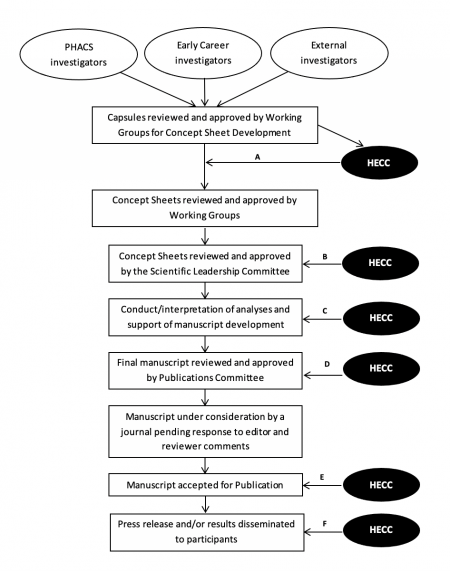HECC Research Study Support

A. Capsule Review: All scientific capsules that are approved within the Working Groups will be forwarded to the HECC leadership for review. The HECC leadership, in collaboration with the Community Task Force, will review the capsule according to its established checklist of criteria. The HECC leadership will provide the lead author of chosen capsules with a menu of options for presenting the capsule to the HECC, such as attending a conference call/online meeting platform, sending a summary in lay language about the proposed research with a list of questions for community members, or sending a short video of themselves explaining the research. The HECC review may include the following: relevance of study aims for community members’ lives and alignment with PHACS’ mission; appropriate contextualization of research topic with regards to social and structural determinants of health; clarity of personal, social, and structural factors that race, sex, and gender identity are proxy for; additional co-variates or confounders to consider; potential limitations of data; inclusion of all PHACS sub-groups or justification if not; the burden of new proposed data collection (if any) on study participants and clinical site staff; and a community ranking of priority of the proposal. The HECC review will be summarized in written form by HECC Leadership and sent to the originating Working Group and lead author to be included in their discussion once the capsule is at the concept sheet stage.
Note: If you are an author with a capsule approved by a working group, please fill out the ESC/HECC Design Review Form to move your capsule to the next stage of the process.
B. Concept Sheet Review: After concept sheets are approved by PHACS Working Groups, they are reviewed by the Scientific Leadership Committee (SLC). The HECC Director or Associate Director and a CAB representative are voting members of the SLC, and for each concept sheet, a rotating HECC reviewer will produce a written review of the concept sheet using our established criteria and formally present this review on an SLC call.
C. Ongoing support: HECC members may join research/writing teams and provide support on an ongoing basis. Additionally, authors may reach out to the HECC Director or Associate Director at any time for additional support.
D. Publications Review: In coordination with the SAC, the HECC PI or Associate Director will attend the Publications Review Meetings to provide review of manuscripts submitted for the PHACS Publications Committee review. This review includes endorsement that the manuscript does not contain major omission or areas of concern to the HECC.
E and F. Manuscript acceptance and results dissemination: The HECC will review a list of publications that have been accepted in journals each month. They will discuss with families and young people affected by perinatal HIV and create lay summaries of these papers for PHACS participants using plain language principles. Lay research summaries may take one of several forms: 1) a designed infographic summarizing results in plain language, displayed online and in print; 2) a short video of an author describing their results and answering CAB or YACAB questions; or 3) a “day in the life of” short video of following a researcher, data specialist, etc. who can explain their role on PHACS and overall trends or findings they have observed. All of these will be displayed on the PHACS website, young adult participant website, and in semi-annual PHACS newsletters (see below). The HECC will also identify publications with findings that should be disseminated to the public or to other researchers, such as via a press release, the PHACS website, and social media. The HECC will support investigators in crafting language to describe the implications of their findings for people living with HIV and clinicians in plain language. Additionally, the HECC will consult with PIs about how best to summarize and communicate recent research findings from their Research Projects. The HECC will also develop a new e-newsletter format to disseminate PHACS findings and human interest stories in lay language to participants who opt in to receive it electronically on a semi-annual basis. The core will also utilize contemporary online trends in service of reaching young adult participant audiences in particular; these may include memes, gifs, vlogs, Buzzfeed-style listicles, and Snapchat and TikTok (both video sharing platforms).
Please email HECC Leadership with questions about this process.

